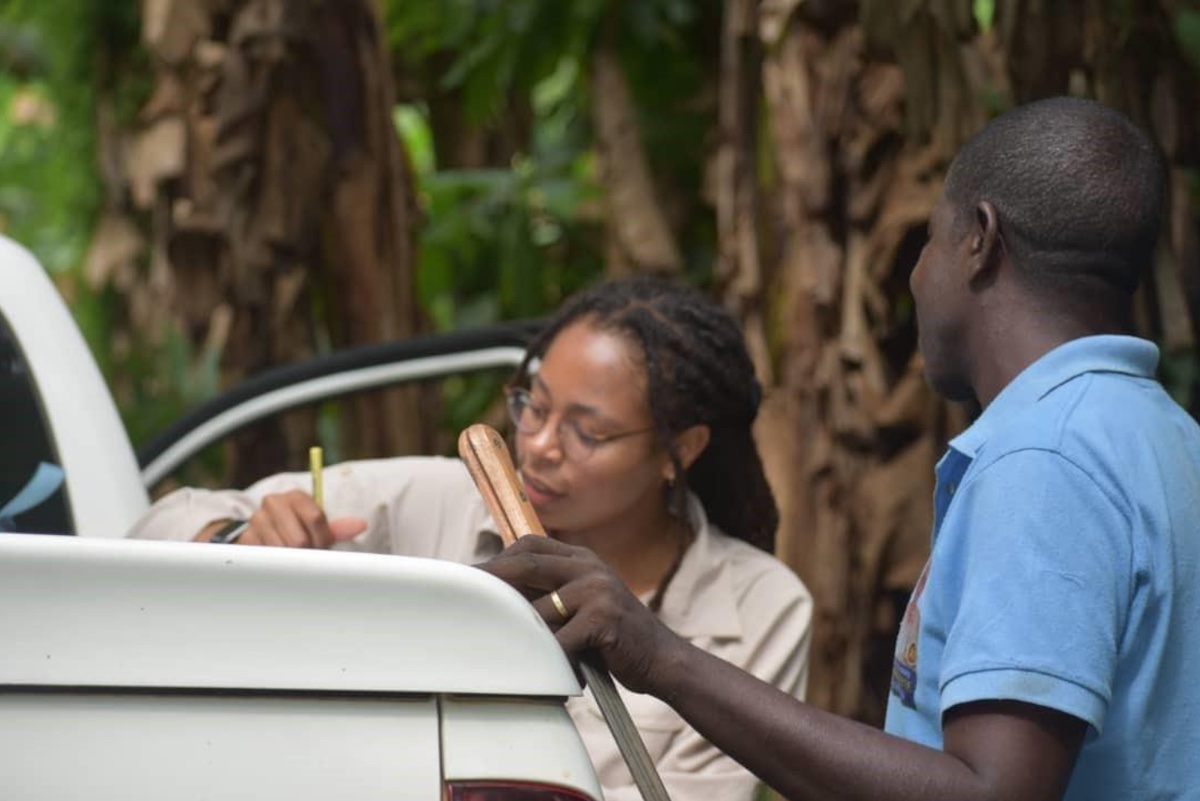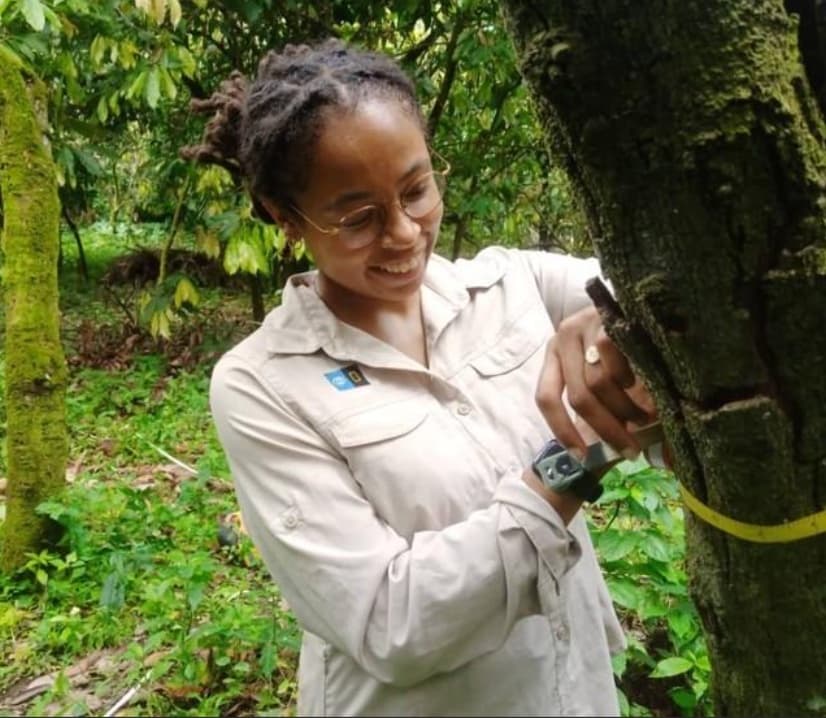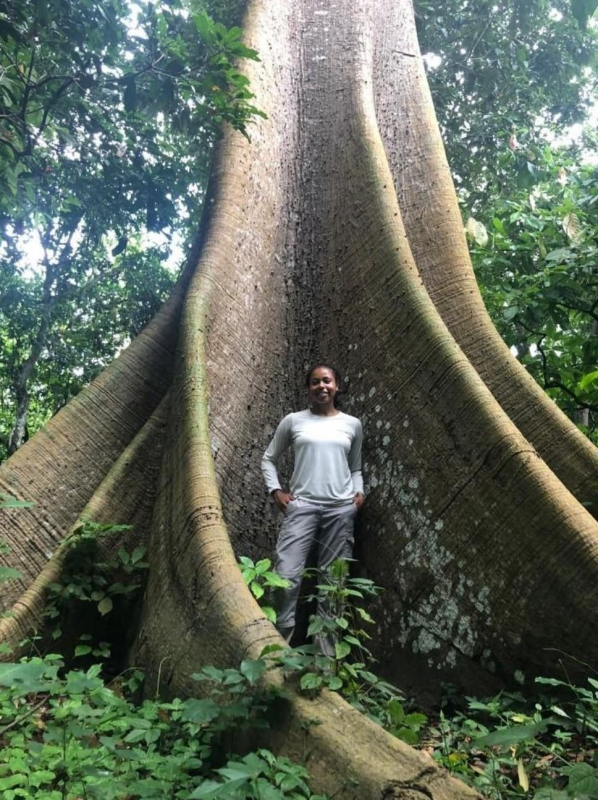Shade trees hold diverse values to cocoa farmers in Ekiti State, Nigeria
New research by NBSI’s Zoë Brown in Agroforestry Systems found that cocoa farms in Ekiti State, Nigeria host a rich diversity of native and economically valuable trees. These trees offer multiple benefits, presenting a valuable opportunity for policymakers to implement certification frameworks that both safeguard and enhance the socioeconomic and conservation value of these agroforestry systems. August 11, 2025
Written by Zoë Brown
A new study published by NbSI’s Zoë Brown in Agroforestry Systems found that cocoa farms in Ekiti State, Nigeria host a rich diversity of native and economically valuable trees. These trees offer farmers financial security, provide climate regulation benefits, and hold immense potential for both conservation and sustainable development goals, if managed well.
Why are cocoa agroforestry systems important in West Africa?
Cocoa supports the livelihoods of millions of smallholder farmers across West Africa, but when grown in low-diversity monocultures, it can drive deforestation, biodiversity loss, and livelihood instability. In contrast, shade-grown cocoa in diverse agroforestry systems offers a way to support both conservation and livelihood diversity.
In Ekiti State, Nigeria, the majority of cocoa agriculture in Ekiti currently exists in agroforestry systems. Yet, little is known about how farmers make decisions around shade tree retention or how they navigate the trade-offs between the benefits and negative impacts of shade trees. This research begins to address this research gap.
The research approach
Through interviews with cocoa farmers and biodiversity assessments of their farms, this study explored the diverse values influencing farmers’ decisions about trees on their cocoa farms.

Fig. 1. NbSI PhD student Zoë Brown conducting fieldwork on shade tree management in cocoa agroforests, Ekiti State, Nigeria.
Key Findings
The cocoa agroforests of Ekiti contain important native biodiversity, highly sought after timber species, and fruit-producing trees, which contributed greatly to overall farmer income.
- Farms featured species of international conservation concern, including Iroko (Milicia excelsa) and Oganwo (Khaya spp.)
- Farms also acted as reservoirs for large, old growth trees. For example, one farm had a Khaya senegalensis with a dbh of 462.92 cm (16.8 m²)

Fig. 2. Example of an old-growth tree within a cocoa farm in Ekiti State, Nigeria.
Shade trees were valued by farmers for their financial benefits and the climate regulation services they provide to cocoa crops.
- “Shade benefits cocoa during dry season and helps with water retention”
- […] to build my house and the money from selling timber to pay my children’s school fees”
However, farmers had to actively manage trees to balance trade-offs between the benefits and negative associations with shade, though the choices to cut, plant, or otherwise manage shade trees also varied from farmer to farmer. For example, some farmers regularly cut trees, while others felt they were too valuable to remove. Some actively planted trees, others relied on natural regeneration.
“Shade benefits cocoa during dry season and helps with water retention”
The main negative associations with shade trees on farms were damage from branches and black pod disease.
- “When trees are too tall, branches drop and damage cocoa”
- “Too much shade damages cocoa pods. Even if we spray it with fungicide, it is out of control.”
Implications of these findings
The prevalence of agroforestry management systems and diversity of native species found on Ekiti cocoa farms presents a valuable opportunity for policymakers to implement certification frameworks that both safeguard and enhance the conservation value of these agroforestry systems. This would not only advance environmental stewardship in Ekiti, but also create additional revenue streams for farmers. Given Nigeria’s complex socio-economic and environmental landscape, harnessing such opportunities is crucial for a sustainable future.
Read the paper
Brown, Z., Olajuyigbe, B., Akinyugha, A. et al. Understanding the diverse values of shade trees on cocoa farms in Ekiti State, Nigeria. Agroforest Syst 99, 157 (2025).
